It’s no secret that Japan hasn’t quite mastered gender equality. Like the rest of the world, the society continues to struggle with closing the gender gap. In many cases, women are often still expected to take on roles serving men, whether at home or at work, while men are expected to provide for their families, and those who play an active role in their children’s lives might find themselves treated with suspicion.
As it turns out, both men and women acutely feel the differences in how the genders are treated. According to a survey done by information technology service Biglobe, more than 70 percent of men and women across the country believed that gender inequality still exists within Japanese society.
Biglobe conducted a digital survey with 1,000 smart phone users from across the country at the end of November last year, asking them about their perceptions of gender equality. Respondents were both men and women, and ranged in age from 20 years old to 69. From each age group, divided into decades, 100 men and 100 women were surveyed to get an even assessment.
The biggest takeaway from the survey was that a majority percentage of participants believe that the genders are not treated equally. When asked, “In everyday life, do you feel that men and women are not treated equally?”, out of the 1,000 respondents, 23.1 percent said “Often”, while 49.9 percent said “Sometimes,” meaning that 73 percent of respondents had such perceptions of gender inequality. By gender, 76.4 percent of women and 69.6 percent of men responded with either “Often” or “Sometimes”, with the most common response for both genders being “Sometimes”.
▼ “In everyday life, do you feel that men and women are not treated equally?” The top row is all respondents, the middle is men, and the bottom women. Key: Red – “Often”; orange – “Sometimes”; green – “Not very often”; blue – “Never.”
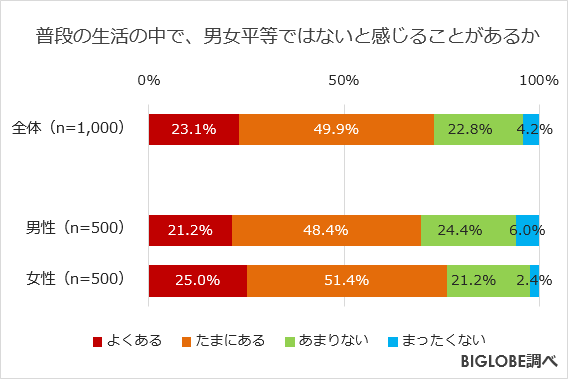
Which indicates that either both men and women perceive themselves as unequal in some aspects of their lives, or they perceive the other gender as receiving the brunt of discriminatory behavior, or both. Either way, the implication is clear: Japanese people believe that not everyone is being treated equally in Japanese society.
466 respondents work to earn a living, so they were asked which aspects of their workplace were unequal. 36.3 percent of men said “Weight of work responsibilities” and 30.8 percent said “Ease of and opportunities for promotion and advancement”. Interestingly, the second highest bracket, at 31.1 percent, said “I don’t feel the work place is unequal.”
The women’s chief concern, on the other hand, was “Ease of and opportunities for promotion and advancement” (47.5 percent), followed by “Pay” (44 percent), then “Weight of work responsibilities” and “The assignment of odd jobs and routine duties” (both 27.7 percent).
Other responses, from most to least for both men and women, include “Treatment of sudden overtime or work late at night”, “Ease of taking holidays”, “Work load”, “The assignment of odd jobs and routine duties”, ”Evaluation criteria”, “Opportunities to share ideas and express thoughts”, and “Other”.
▼ “What aspects of the workplace do you feel are unequal?” Green represents everyone; blue, men; and pink, women.
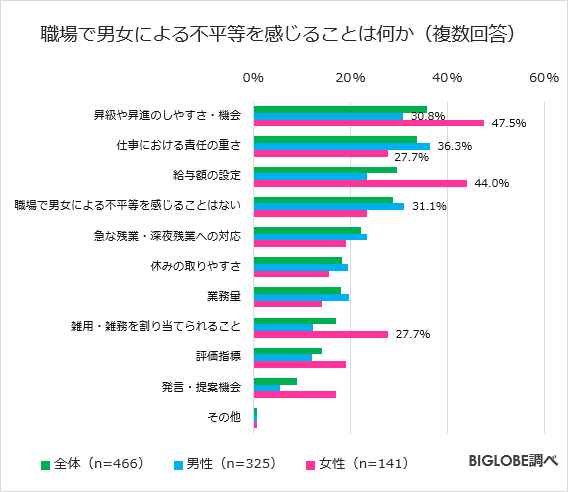
When the 466 working respondents answered the question, “What do you think about male employees at your workplace receiving childcare leave?” only 36 percent said “I’m in favor of it”, while 52.4 percent said “I’m somewhat in favor of it.” Still, that means nearly 86 percent of respondents believed men should receive some form of parental leave. There was only a four percent difference between men and women’s responses, though, but interestingly, more women voiced their support for the idea than men.
▼ “What do you think about male employees at your workplace receiving childcare leave?” From top to bottom: everyone, men, women. Key: Blue – in favor; green – somewhat in favor; orange – somewhat against; red – against.
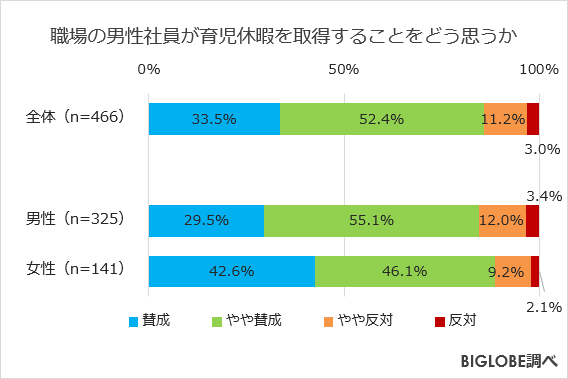
However, when asked whether they felt any reluctance to take parental leave, 18.2 percent of men said “Yes”, while 35.2 percent said they felt some reluctance, for a total of 55.4 percent. Compared to the women, men overall felt more reluctant to take parental leave.
▼ “Do you feel reluctant to take parental leave?” The patterning to this chart is the same as above, with purple being “Yes” and blue being “No”.
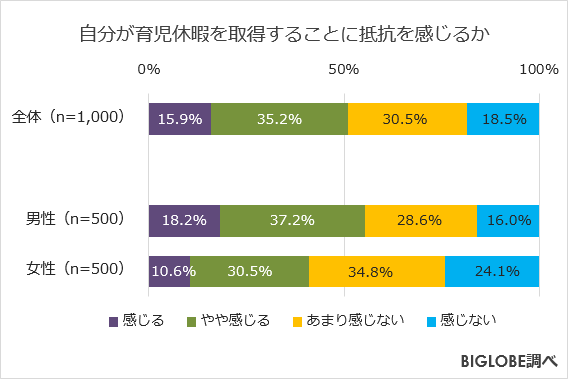
Between both men and women, however, the reasons behind feeling that reluctance were similar: “I’d feel bad for the company” (58.8 percent), “It would be inconvenient for the company and the clients” (51.7 percent), and “I can’t go without the salary” (31.5 percent) (participants were given the option to choose multiple responses).
Other responses were, in order of most to least: “I worry about what my boss and coworkers will think”, ”My job senses will grow dull”, “It’s unprecedented at my workplace”, “By taking time off I’ll ruin my career plan”, “My partner’s family will think badly of it”, and “Other”.
▼ “What is the reason you feel reluctant to take parental leave?”
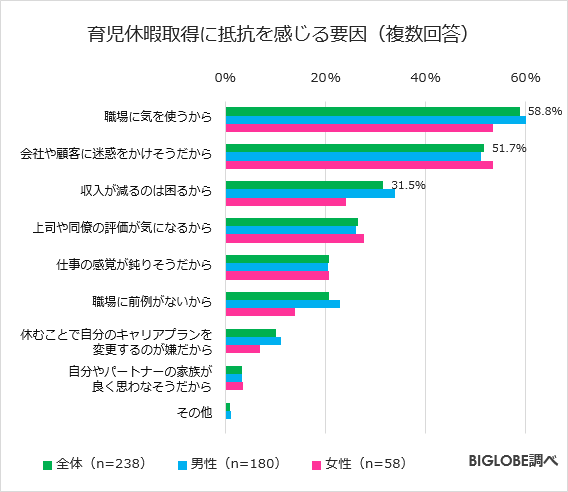
Though participants weren’t asked who exactly was on the receiving end of these inequalities, what is clear is that men and women still don’t see themselves or each other as being treated equal, especially in the workplace. It’s a complex problem that has multiple repercussions, including, some experts say, contributing to the declining population of Japan. Biglobe says this is the first wave of results from this survey, so maybe the statistics that will be unveiled later on will help shed light on the issues that the people of Japan are facing every day, and we can come closer to a solution.
Source: BIGLOBE via Nico Nico News via My Game News Flash
Read more stories from SoraNews24.
-- Nearly half of young Japanese women say they “hate” the company they work for in survey
-- Nearly 40 percent of young, unmarried Japanese people say they don’t want a relationship
-- Majority of Japanese men in their 20s say they want men-only train cars in survey
- External Link
- https://soranews24.com/2020/01/18/survey-says-more-than-70-percent-of-japanese-people-think-gender-inequality-exists-in-japan/
 Take our user survey and make your voice heard.
Take our user survey and make your voice heard.















11 Comments
Login to comment
mitoguitarman
The other 30% are top management & government males
oldman_13
When the people of your own country, even a small section of it from an opinion poll, thinks there's an issue with gender inequality in your country, could be a problem I think.
Raw Beer
The two genders are not identical. I am not saying one gender is better than the other, but they have on average different interests. So we should not expect equality of outcome. It's not like men are paid more for the exact same work.
ushosh123
While there are certainly injustices, but the fact the 2 genders' view themselves to have different rolls means there are inequalities, but not neccessarily injustices.
lostrune2
Well duh, girls are still expected to serve coffee
girl_in_tokyo
Only two? That's not self-serving at all, is it.
Because it is not common for women to sexually harass and grope men on the train.
Because it is not common for women to rape and sexually assault men.
If women didn't have to be afraid of men sexually harassing, assaulting, and raping us, these would not be necessary. Why don't you get to work on that.
lostrune2
Time to turn the tables; don't be afraid